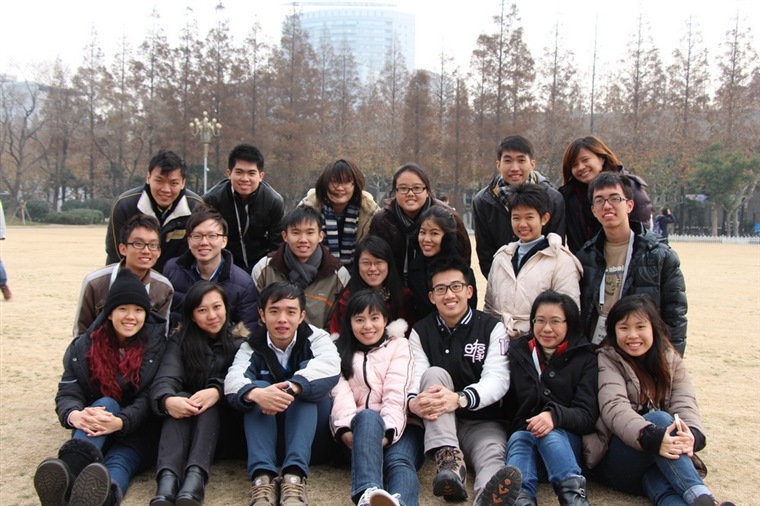Business China Youth Chapter China Learning Journey 2013 – Experiencing cosmopolitan Shanghai and historical Beijing
On 13 December 2013, a group of 20 Business China Youth Chapter (BCYC) members embarked on a 10-day China Learning Journey to Shanghai and Beijing. Organised by Business China for the fourth year running, the trip was supported by China’s Office of Chinese Language Council International (Hanban).
Through company visits, cultural immersions and interactions with local students, Business China hopes to provide an effective platform for the participating Singaporean youths to gain a holistic and in-depth understanding of contemporary China and the implications of China’s rise to Singapore. The trip also aims to create opportunities for these youths to build friendships and networks with professionals and students in China as a foundation for future cooperation.
This group of like-minded BCYC members from National University of Singapore (NUS), Nanyang Technological University, Singapore Polytechnic, Ngee Ann Polytechnic and Hwa Chong Institution (HCI) share a common interest in China and are passionate with China’s contemporary developments. The four HCI students joined this immersion trip as winners of the Distinction Award of the 6th China Studies Seminar.
Opening Session and interaction with local university students
During the opening session at East China Normal University, students from both countries had a fruitful discussion of similarities and differences in terms of education and future career plans between Singapore and China students. In another interaction session with local and Singapore exchange students from Fudan University, issues concerning studying and working life in China were actively discussed.
The BCYC members also had the opportunity to learn about various topics including environmental conservation efforts and business opportunities in China through a series of lectures conducted in Fudan University in Shanghai and University of International Business and Economics (UIBE) in Beijing.
Other than classroom exchanges, the delegation were brought on a guided tour by Associate Professor Sha Yongjie from Tongji University and his two assistants. They explored the Power Station of Art, housed in the former Urban Future Pavilion from the 2010 Shanghai World Expo as well as local housing in the City God Temple area, thus understanding the challenges of urban planning in Shanghai. Despite the wintry rain, Professor Sha patiently shared his knowledge with the BCYC members, displaying his deep concern towards the city of Shanghai and allowing the members to gain a deeper understanding.
When asked about his experience of interacting with Chinese students, Patrick Lim from HCI said that his previous knowledge of China were mostly acquired through classroom studies and were of a macro perspective and hence, “I benefitted greatly from the interaction with local students and am now better able to understand their way of thinking. This is something that cannot be learnt through textbooks but only through personal interactions.”
Jason Lin from NUS shared his personal reflections after interacting with the local students. “Firstly, Singaporeans should appreciate what we have and secondly, we should try to get out of our comfort zone. Through these interactions, other than understanding China, we also gained a better understanding of ourselves and our plans for the future.”
Gaining insiders’ perspectives from Singaporean professionals based in China
Besides local students, the Learning Journey also provides exclusive opportunities for BCYC members to learn from Singaporean professionals based in China.
The BCYC delegation paid an official visit to the Consulate-General in Shanghai and were hosted by Consul-General Ong Siew Gay, and Deputy Consul-General Chi Chiew Sum. Key representatives from agencies like the Economic Development Board, International Enterprise Singapore, Singapore Tourism Board and Contact Singapore were also present to provide an overview of their respective functions in promoting Singapore and their roles in maintaining the Singapore-China relations. During lunch hosted by the Shanghai Mission, students engaged in enthusiastic conversations with CG, DCG and agencies’ officials over topics ranging from working life in China to bilateral relations.
In another exclusive networking session, students enjoyed an informal dinner with Exco members from the Shanghai Singapore Business Association (SSBA). These successful individuals shared their vast experience of doing business in China and advised interested youths to enter the China market as soon as possible to gain a head start. Students were also told to set a long-term vision for their China plans, rather than to just focus on immediate monetary returns.
Reporting for Lianhe Zaobao from Shanghai, Ms Gu Gong Lei, shared her personal experience working as a foreign correspondent in China in a closed-door session. Her personal accounts of news gathering during the Bo Xilai Saga while serving at the Chongqing bureau, was as captivating as the Saga itself. In addition, Ms Gu highlighted the differences between the practice of journalism in Singapore and China; and touched on the challenges and restrictions faced by media in China.
In another sharing session in Beijing, Ms Tan Siok Siok, Documentary Filmmaker and Founder of Kinetic ONE, a social video platform in China, expressed candid views on the rise of new media, the state of censorship and the vast opportunities available in China. She noted that, “In China, everything is more difficult but everything is possible.” The visit to her company and sharing by her associates provided an alternative glimpse at how companies may be ran and managed in China; and remained an inspiration to the delegation.
Phee Xin Hui from Singapore Polytechnic said that the rare opportunity to interact with these business professionals benefitted her greatly and she learnt how to network, in terms of starting a conversation and maintaining the relationships built.
Visiting Singapore companies based in China
In Shanghai, the delegation conducted a series of company visits to Singapore companies that have significant presence in China in a bid to understand how they customise their operations in China and cater to the local market. Management level officers from BreadTalk, Ms Ruth Wu; CHARLES & KEITH, Mr Kay Zhang; and the Founder of Cendes International, Mr Jason Ang provided insights into the opportunities and competitiveness of the China market, in their respective sectors.
Participating in cultural activities
Business aside, the learning journey is also a trip back in time for the youths to immerse themselves in the rich cultural heritage of China. Participants tried their hands at paper cutting, dumpling making and Chinese calligraphy, and had a whale of a time.
During the official visit to the headquarters of Chinese Hanban and Confucius Institute in Beijing, interactive games and props enticed the youths to experience China’s culture in a fun and creative way at the Chinese Culture Experience Centre. During a sharing session with Hanban officials, participants shared that this learning journey expanded their horizons and expressed their gratitude to Hanban for their generous support.
In Shanghai, members enjoyed a dazzling view of the bustling city skyline from the Oriental Pearl Tower. They also visited the ancient water town of Zhujiajiao, dubbed “Little Venice”, and enjoyed local delicacies alongside breathtaking scenery.
Ang Cheng Koon from National University of Singapore commented that these cultural activities provided a deeper insight into a part of China’s culture which cannot be experienced as a mere tourist. “Our relationship with China goes beyond transactional. Other than developing economic and political ties, cultural exchanges are crucial to achieve mutual understanding and long-lasting relations between both countries.”
Singapore’s position and relevance to a fast-growing China
Throughout the 10-day journey, participants were tasked to reflect: As China gain economic prowess and eminence on the world stage, how can we better position ourselves in the whole scheme of global development.
As noted by several individuals from SSBA and students on internship stints in China, the Singapore brand is synonymous with trustworthiness, professionalism, efficiency, and is thus highly regarded in China. However, this also means that every Singaporean who ventures into China has a responsibility to uphold that honour.
Ng Hwee Teng from Nanyang Technological University remarked, “Singapore’s current position is advantageous but we must continue to constantly reflect and reinvent ourselves. Our advantage may be derived from the Singapore brand, our bilingualism and biculturalism. But after interacting with the local students, I realised that their English standards are steadily improving and they have the added advantage of knowing China better than us. As Singaporeans, I think it is time for us to start thinking the areas in which we can strengthen our advantages and further foster our competitive edge.”
It is with these key take-aways in mind that participants concluded the 10-day learning journey which has been intensive and comprehensive in scope, content and intent.
Concluding the journey, trip leader Lee Ying Ying said, “This trip made us truly appreciate the importance and the practicality of being bilingual and bicultural. China is a country no one can afford to ignore; and since Singaporeans already have a head-start in our cultural and linguistic affinities with China, we have every reason to nurture that link towards mutually beneficial ends. I hope the many seeds of friendship planted during this trip will grow into even stronger collaborations in future.”

